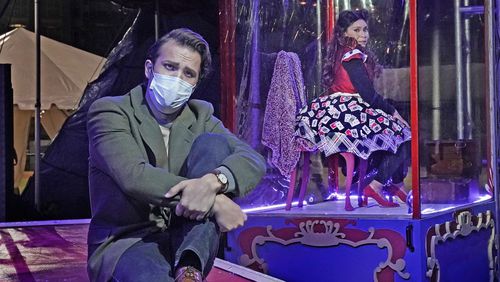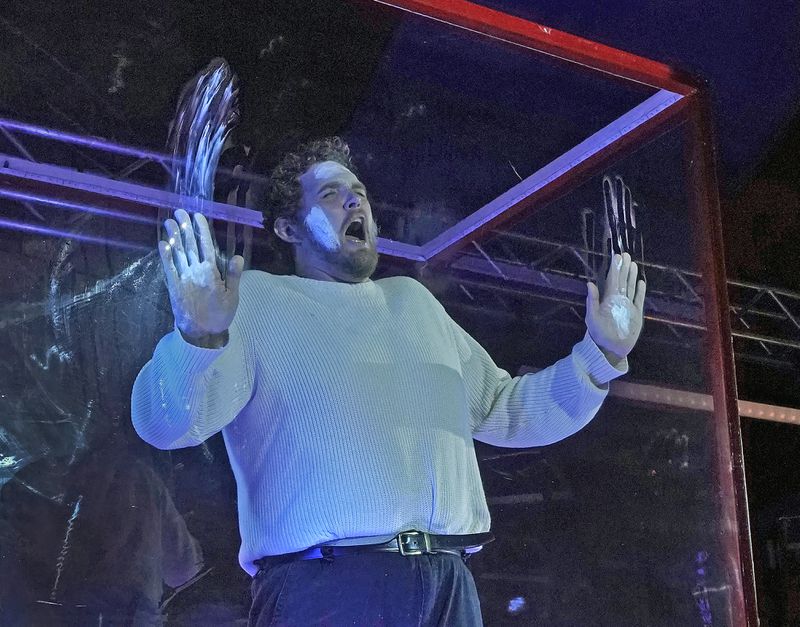In the 2020 telling of Ruggiero Leoncavallo’s 1890s opera “Pagliacci,” the famous clown Canio has COVID-19.
Tomer Zvulun, Atlanta Opera’s general and artistic director, opened the organization’s truncated 2020-2021 season by planting the story firmly in the present.
Bringing live performance to live audiences is no longer a given. Michigan Opera Theater just wrapped its pandemic version of “Twilight: Gods,” but that was drive-through theater presented in a parking structure. The Atlanta Opera gave a performance Thursday to a masked and distanced audience under an open-sided tent on the Hermance Stadium baseball field at Oglethorpe University. The two-act opera, which is sung in Italian without intermission, felt safe and actually kind of normal.
“Pagliacci” contains an opera within an opera. After a fourth-wall breaking introduction by the devilish clown Tonio (baritone Reginald Smith Jr.), his troupe prepares for the final show of an extended residency. The star of the show is Canio (tenor Richard Trey Smagur). But he has a problem; his wife, Nedda (soprano Talise Trevigne), is the object of Tonio’s unwelcome advances; she is also tied up in a secret affair of her own with the villager Silvio (baritone Joseph Lattanzi). Canio finds out about the tryst, and the personal squabble comes to a real-life deadly end during that evening’s theatrical performance, during which Beppe (mezzo-soprano Megan Marino) plays the illicit lover to Nedda’s character. Be prepared for simulated gunfire.
Smagur, as Canio, excelled among the exceptional cast. His finest moment came when Canio readied himself for the second-act spectacle after discovering his wife with her lover. Smagur channeled the character’s pain into a gripping, tragic aria. Nearly rending his garments from the anguish, sobbing uncontrollably, he then lapsed into a coronavirus coughing fit.
Credit: Ken Howard
Credit: Ken Howard
Bringing the story to our distanced reality, Silvio’s first-act duet with Nedda begins as a cell-phone conversation, and Canio has Beppe film one of his early arias on a smartphone, broadcasting a live feed to his adoring fans. The chorus is a disembodied, pre-recorded specter over speakers; Zvulun worked around their physical absence by sending a host of jugglers and other professional clowns to the stage. (The chorus parts had been recorded one at a time in isolation and stitched together to make the final product.) The director also looked to 17th-century Bunraku puppet theater to bridge the literal gap between characters.
Preparing for the first entry in the opera’s Molly Blank Big Tent Series was a difficult task, to put it mildly. In addition to months of artistic planning, cast and crew submitted to weekly COVID tests — part of a 37-page list of safety protocols. In the extended cast rehearsal period, singers had to grow accustomed to performing while wearing masks, emoting and creating connections while making sure to not get too close to one another, no matter the storyline. For a few of the arias, singers removed their masks once situated in one of four telephone-booth-like plastic enclosures.
Much as it’s unfair to nit-pick the Atlanta Symphony Orchestra’s pre-recorded fall concerts, judging the opera requires proper context. The company of strong, compelling singers were able to appropriately project when separated in their protective booths but when they put on masks to roam around on the stage, the microphone-assisted voices came out muffled. Aside from the chorus, the biggest unfortunate concession came in the form of Rolando Salazar’s diminished offstage orchestra, which was piped in through the speakers. Due to safety protocols, the smaller ensemble had to noticeably rely on a keyboard to fill out the orchestration.
“Pagliacci” is a traditional story told here with very untraditional staging. It was a breath of fresh air to see it live.
OPERA REVIEW
Atlanta Opera’s “Pagliacci”
7:30 p.m. Oct. 24, 28, 30; Nov. 1, 5, 7, 11, 13. $149-$399 for a pod of 4. Hermance Stadium at Oglethorpe University, 4484 Peachtree Road NE, Brookhaven. 404-881-8885, atlantaopera.org.
About the Author







